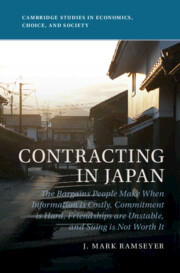 Contracting in Japan
Contracting in Japan Published online by Cambridge University Press: 10 August 2023
Japanese Buddhist temples had traditionally relied on the high levels of social capital within the local village to enforce the giving they needed to stay solvent. When men and women began to leave the villages for the anomic cities, the temples found themselves without the necessary funds. In response, they turned from what had been an effective village retainer contract to an individual fee-for-service model of finance. Unfortunately for the temples, they market their priceable services (primarily ceremonies connected to deaths) within competitive markets. Unable to sell above marginal cost, they have been unable to cross-subsidize their other – less priceable – services.
To save this book to your Kindle, first ensure [email protected] is added to your Approved Personal Document E-mail List under your Personal Document Settings on the Manage Your Content and Devices page of your Amazon account. Then enter the ‘name’ part of your Kindle email address below. Find out more about saving to your Kindle.
Note you can select to save to either the @free.kindle.com or @kindle.com variations. ‘@free.kindle.com’ emails are free but can only be saved to your device when it is connected to wi-fi. ‘@kindle.com’ emails can be delivered even when you are not connected to wi-fi, but note that service fees apply.
Find out more about the Kindle Personal Document Service.
To save content items to your account, please confirm that you agree to abide by our usage policies. If this is the first time you use this feature, you will be asked to authorise Cambridge Core to connect with your account. Find out more about saving content to Dropbox.
To save content items to your account, please confirm that you agree to abide by our usage policies. If this is the first time you use this feature, you will be asked to authorise Cambridge Core to connect with your account. Find out more about saving content to Google Drive.